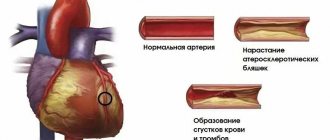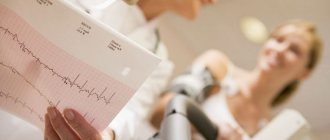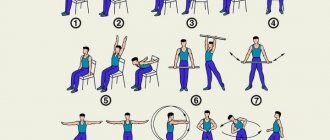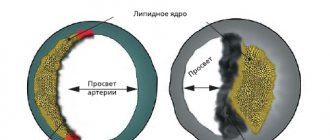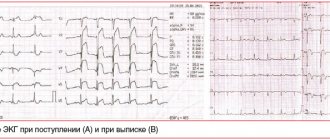30% of all deaths in Russia occur due to alcohol abuse. Ethyl alcohol changes the physiology of the entire body, but its effect on blood vessels and the heart is especially severe. Remember the main thing: there really are no “safe” doses. There are only dosages that are relatively tolerable for the heart muscle, but the slightest excess beyond this threshold can be fatal at any time.
Content:
- How alcohol affects the heart
- What happens to the heart when taking high doses of alcohol?
- Screening for people with heart problems caused by alcohol
- Heart treatment for alcoholism
There is no need to believe that alcohol has a positive effect on the functioning of the cardiovascular system.
Talk about the need to drink a certain amount of vodka or good red wine every day is a banal myth. Most often they are invented by people who want to drink but have serious illnesses. Alcohol and the heart are incompatible concepts. As a result of drinking, nervous tissue is invariably damaged. Following this, ethanol attacks the heart muscle. Then the addict develops alcoholic cardiomyopathy. If left untreated, it can be fatal. Is it possible, knowing about such consequences, to talk about benefits?
What is safe drinking?
First of all, it means the quantity and method of drinking alcohol. According to the findings of scientists, it is worth focusing on the following information:
- For men, a relatively safe dose of ethanol per day is 25-30 grams, which is comparable to 70 g of strong drinks, 2 glasses of wine or 2-3 glasses of beer. For women, the dose should be half as much.
- When drinking a large amount of alcohol in a short period of time, the heart experiences higher stress than when drinking regularly in small doses.
- Alcohol is contraindicated for children, pregnant and lactating women in any quantity.
- The negative effects of ethanol can be reduced by drinking alcohol with meals.
How alcohol affects the heart
Drinking alcohol in high doses causes the development of myocardial dystrophy. This is a pathology in which metabolic processes in the heart muscle are disrupted. As a result of the disease, the load on the organ increases significantly, and it ceases to cope with it.
There are two main causes of myocardial dystrophy. This:
- a rapid decrease in the production of cardiocytes - substances that provide heart cells with energy;
- decrease in thiamine levels.
Both factors are associated with drinking. The difficulty is that it is almost impossible to recognize the development of disorders in the early stages, when life-threatening complications can still be avoided. The alcoholic feels good for a long time. When he gets to a specialized clinic, it turns out that his heart is working at the limit of its capabilities.
Progressive myocardial dystrophy leads to:
- hypertension, hypertensive crisis;
- angina pectoris;
- pain in the chest area;
- poor quality myocardial nutrition;
- ischemic disease.
The effect of alcohol on the heart is so harmful that the organ cannot function fully. This is why alcoholics often die due to stroke, hypertensive crisis, or heart attack.
Cardiovascular health: how to take care of it
The heart has no days off or holidays. The organ works smoothly in any circumstances, and always needs all possible support. Regardless of whether there are obvious heart problems or they are not yet felt, you need to take care of the main engine constantly.
Give up alcohol and cigarettes forever. The most destructive effect of alcohol on the heart and blood vessels occurs as a result of a combination of these two bad habits. Nicotine excessively constricts blood vessels, creating oxygen starvation; alcohol, on the contrary, dilates blood arteries, making them fragile. If an alcoholic smokes more than 3 cigarettes a day, the likelihood of a stroke or heart attack increases 3 times than if he simply abused alcohol. But both habits are deadly separately.
Watch your weight. Overweight people are always at risk. Fat that envelops internal organs is the most dangerous: unlike subcutaneous fat, it is almost impossible to eliminate. In such cases, myocardial dysfunction occurs much more often. Running, walking, swimming and cycling can help you lose weight, but the permissible load should only be determined by a specialist.
Review your diet:
- Replace pork and lard with beef and poultry.
- Drink no more than 1.5 liters of clean water per day so as not to cause swelling.
- Remove canned food from your diet and do not exceed the daily salt intake - 5 grams.
- Limit your coffee intake or eliminate it completely.
- Apples, dark grapes, plums, strawberries, garlic, flax seeds, grape seeds, arugula, onions, asparagus, nuts, honey and fatty fish are those foods that are good for blood vessels and the heart, which should be included in the diet regularly or as often as possible .
The harm of alcohol and its harmful effects on the heart and blood vessels is difficult to exaggerate. But there is no benefit, even conditional, from alcoholic drinks. And if a young body can somehow resist the threat, then after 40 years the consequences of drinking alcohol can cost one’s life.
What happens to the heart when taking high doses of alcohol?
As soon as the heart muscle is exposed to the negative influence of large amounts of alcohol, the following pathological changes are observed:
- the myocardium begins to contract poorly;
- heart rhythm is disturbed (usually towards tachycardia);
- blood oxygen saturation decreases (hence severe shortness of breath);
- The minute volume of blood decreases, due to which the atria and ventricles do not receive important nutrients and oxygen.
Drinking heart patients often develop edema. They suffer from an unpleasant feeling of lack of air. If you ignore all these symptoms, dangerous complications cannot be avoided in the near future.
Treatment with traditional methods
Traditional medicine, proven over decades, always comes to the rescue of a person’s illnesses. In fact, the following suggested ways to overcome a hangover are so simple and useful that everyone who decides to drink alcohol should know about them:
- You can reduce hangover symptoms with brine or sauerkraut juice. You can also drink kefir, orange or tomato juice. Don't forget to drink plenty of fluids. Any liquid will significantly improve the patient's condition. If a headache is added to your hangover, you can drink tea with lemon or cranberry juice.
- An egg will be no less beneficial than water. A small amount of vinegar, ketchup and salt are added to a raw egg. The cocktail is drunk in one gulp.
- You can add castor oil to warm milk, two tablespoons of oil per glass of liquid. You need to drink in large sips.
Screening for people with heart problems caused by alcohol
Patients who have cardiovascular diseases or are prone to developing them and who drink alcohol frequently and in large quantities should definitely be examined.
It is good if diagnostic procedures are suitable at the stage of preparation for coding in a narcology clinic. Then the doctor will be able to tell which option of anti-alcohol therapy is most appropriate, and the cardiologist will prescribe an effective treatment program for the identified cardiac disorders. When identifying alcoholic cardiomyopathy, the following diagnostic measures are used:
- Examination and interview of the addict. The doctor finds out how long ago and what kind of alcoholic compounds the patient has been taking, whether he was previously coded, and whether he underwent therapy for cardiac pathology.
- Study of percussion and auscultation patterns. The specialist listens to heart sounds and taps the chest area. Particular attention is paid to noise and rhythm.
- Carrying out ECG and ultrasound. These diagnostic methods are highly accurate, safe and effective. Based on their results, the cardiologist can easily make the correct diagnosis.
It is very important that a person undergoing diagnosis and planning treatment for heart disease observe the law of sobriety. It is unacceptable to go to doctors during the day and get drunk in the evening.
Consequences of ignoring the problem
Hangover syndrome does not tolerate neglect. As soon as alcohol enters the body, the heart increases in size, and as a result, the person’s weight increases. Heart pain may increase each time you drink alcohol. In a normal state, a person will not feel discomfort, but as soon as he drinks alcohol, the pain in the heart intensifies.
A hangover is the first call to quit drinking. Otherwise, the patient experiences deformation , various disorders arise, irritability prone to aggression, paranoia, epilepsy, volitional character traits are deformed, and much more.
An hour-long feast with drinking alcoholic beverages is not worth ruining human life. Think about it!
If you cannot cope with a hangover, then call a narcologist to your home! An experienced doctor will quickly help you get rid of all symptoms.
Heart treatment for alcoholism
To support the functioning of the main organ, alcoholic patients with heart disease are prescribed medications for:
- pain relief;
- reducing the voltage level;
- elimination of degenerative and dystrophic processes in the myocardium;
- normalization of heart rate;
- strengthening the whole body, stimulating the immune system.
It is very important to improve your heart function during the pre-coding phase. But even after coding, cardiotherapy does not stop. The patient consults a cardiologist for as long as necessary.
Take care of your heart - don't drink alcohol. On holidays, if necessary, use only high-quality alcohol and in small quantities. Any drinking is a blow to your heart. It is impossible to predict in advance how strong it will be. It's important to remember this.
Need some advice?
OR CALL A DOCTOR
CALL!
+7
How does alcoholism develop?
There are three stages of alcoholism.
The first is the stage of mental dependence.
At this stage, it becomes habitual for a person to drink alcohol in order to forget about troubles and adversities, facilitate contact with others, and relax. A person is constantly looking for a reason, appropriate company, to drink. Control over the amount of alcohol consumed is lost: once a person starts drinking, he cannot stop and reaches a state of severe intoxication. In addition, at this stage, a person’s threshold of sensitivity to alcohol decreases, that is, in order to achieve the desired level of intoxication, he needs a dose 2-3 times larger than before. The gag reflex, which is the body’s defense mechanism during alcohol poisoning, disappears. When a person gets drunk, he loses control of himself, often commits reckless acts, and later cannot remember what happened to him the day before. After alcohol abuse, sleep deteriorates, after drinking, the mood deteriorates, sweating, palpitations, and sometimes hand trembling are noted.
The second is the stage of physical dependence.
Regular alcohol abuse leads to changes in the biochemical processes of the body, as a result of which the regular intake of alcohol into the body becomes necessary for its normal functioning. At this stage, signs of an alcoholic hangover appear and become established. A person, being in a state of hangover, experiences many unpleasant sensations - headache, nausea, sweating, palpitations, anxiety, trembling fingers. In order to alleviate the condition, a person drinks alcohol again - gets a hangover.
From the moment a hangover appears, a person is terminally ill. The only measure that can help stop the disease is a complete abstinence from drinking alcohol in any form.
This can be repeated for several days - 3 days or more. Binges occur. In the absence of alcohol entering the body, a person experiences mental disorders, headache, thirst, loss of appetite, muscle tremors, irritability, and aggression.
The third is the stage of personality degradation.
A person becomes indifferent to family and friends, neglects the most basic rules of morality and ethics, and is indifferent to his behavior. His memory is deteriorating and his intelligence is decreasing. At this stage, people begin to drink “whatever”, as long as the liquid contains alcohol. Drunkenness is constant (daily) in nature or is expressed in binges that stop due to a sharp deterioration in physical condition and often require medical care, without which a person can die. At this stage, the changes that have occurred in the internal organs are irreversible. Alcohol completely destroyed their normal functions.
Heart failure from alcohol
Heart failure is a widespread disease. Heart failure is a condition where, as a result of damage to the heart, the heart muscle weakens and cannot satisfactorily perform its pumping function. As a result, the body's supply of oxygen and nutrients is disrupted.
Causes of heart failure
Heart failure most often develops as a result of coronary heart disease (myocardial infarction, angina pectoris). Arterial hypertension, valvular heart disease and cardiomyopathies also lead to heart failure.
How does chronic heart failure manifest?
The most common symptoms are shortness of breath and weakness. Initially, everyday physical activity is not accompanied by weakness, shortness of breath or palpitations. Then it is somewhat limited, but at rest there are no complaints. Everyday stress may cause weakness, shortness of breath, or palpitations. Over time, as the disease progresses, complaints appear with little physical activity and at rest.
In heart failure, edema develops in the body due to water and sodium retention. They appear first in the ankle area and disappear after rest or towards the end of the day, and then may spread and do not disappear after a night's rest.
Drug therapy for heart failure
Only a doctor after examination can make a diagnosis and prescribe treatment. Different groups of drugs are used to treat heart failure. Regular and correct use of medications will help improve the health of patients. You need to know the names and dosages of the medications you are taking and strictly follow your doctor's instructions. Non-drug treatment methods are of particular importance in improving the health of patients.
Weight monitoring
Patients are advised to weigh themselves regularly (it is better to weigh themselves during some daily activities, for example, after the morning toilet), and in the event of a sudden unexplained weight gain of more than 2 kg in three days, inform the doctor or increase the dose of the diuretic.
Diet
Salt restriction (2-5 g/day) is more important in severe heart failure. Salt substitutes should be used with caution, as they may contain potassium and in large quantities, especially when taking ACE inhibitors simultaneously, cause hyperkalemia.
Liquid
In patients with severe heart failure, regardless of the presence of hyponatremia, free fluid restriction to 0.6 l/day is indicated. Vitamins A1, B1, B2, C, PP are added. Meals are fractional (for the whole day, bread 150 g, sugar 40 g, butter 10 g).
It is acceptable to drink alcohol in moderate doses (a bottle of beer or 1-2 glasses of wine per day). If alcoholic cardiomyopathy is suspected, alcohol is excluded.
In obese patients, treatment of heart failure includes weight loss. We speak of being overweight if the body mass index (BMI) = weight (kg)/height (m2) is 25-30; if it exceeds 30, obesity is diagnosed.
Pathological weight loss
Pathological weight loss is observed in approximately 50% of patients with heart failure. The decrease in fat and lean body mass that accompanies such weight loss is called cardiac cachexia. This condition is an important predictor of reduced life expectancy. Pathological weight loss should be suspected if:
- body weight is less than 90% of ideal
and/or
- there is a documented unintentional weight loss of more than 5 kg, or 75% of baseline (measured in the absence of edema) over 6 months and/or
- BMI is less than 22 kg/m2.
The goal of treatment is to achieve weight gain not through edema, but preferably through muscle mass through adequate physical activity. If weight loss is caused by nausea, shortness of breath or a feeling of fullness in the stomach, frequent small meals are recommended.
Smoking
Quitting smoking is desirable in all cases. The use of auxiliary products, in particular nicotine patches, chewing gum, etc., should be strongly encouraged.
Staying in high mountains, places with a hot or humid climate is contraindicated. Short flights are preferable to long trips by other means of transport. In case of severe heart failure, long flights are fraught with complications (possible dehydration, sudden swelling of the legs, deep vein thrombosis), which patients should be warned about. Possible consequences of changes in diet during travel in the form of acute gastroenteritis. If water and salt are lost in hot and humid climates, the dose of diuretics and vasodilators must be adjusted accordingly.
Sex life
It is impossible to give unambiguous recommendations on sex life. If necessary, it is recommended to take nitrates under the tongue before sexual intercourse and abstain from particularly violent emotions. In functional class II, the risk of decompensation provoked by sexual activity is average, and in functional class III-IV it is high. Little is known about the effect of heart failure treatment on sexual function.
Immunization
There are no reliable data on the effects of immunization in heart failure. Immunization against pneumococcal disease and influenza reduces the risk of respiratory infections that can worsen heart failure. Immunization against influenza is widely used.
In case of acute heart failure or destabilization of chronic heart failure, rest is necessary, including bed rest. To prevent the undesirable consequences of bed rest, including venous thrombosis, passive exercises are performed. As the condition improves, they move on to breathing exercises and gradually increase activity.
Exercise stress
If the patient's condition is stable, then moderate physical activity, which prevents muscle detraining, should be encouraged. For patients with severe functional impairments, short training sessions (15-20 minutes) 3-5 times a week are recommended. The intensity of training is selected so that the heart rate reaches 60-80% of a predetermined maximum value. Preference is given to walking at an average pace (60-80 steps per minute).
The doctor must talk with the patient so that the patient can actively participate in treatment. The patient must know and understand:
- improvement may be slow and incomplete even after weeks, and with some drugs, months of treatment;
- doses of ACE inhibitors, angiotensin receptor blockers and beta-blockers should be gradually increased to a certain level, although this will not bring direct improvement;
- in case of dehydration (at rest, with profuse sweating in hot climates), the dose of diuretics should be reduced;
- when blood pressure decreases, it is necessary to reduce the dose of diuretics, and, if necessary, ACE inhibitors, angiotensin receptor blockers and beta-blockers;
- ACE inhibitors may cause cough and taste disturbances;
- Non-steroidal anti-inflammatory drugs should not be taken simultaneously with ACE inhibitors;
- if shortness of breath suddenly appears or as a preventive measure in certain situations, you can take nitrates - in the form of tablets under the tongue or an aerosol.
Treatment of heart failure has several goals. First, eliminating the symptoms characteristic of this disease. Secondly, and no less important, is to protect organs from damage: heart, kidneys, lungs, brain, liver, blood vessels. The third goal is to improve the patient's quality of life. This means that treatment for heart failure should provide the patient with the opportunity to live the same full life as his healthy peers.
